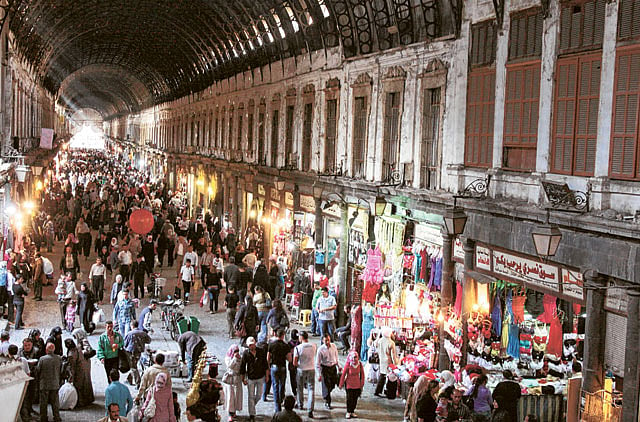Beirut: The dramatic decision by Arab states to turn against President Bashar Al Assad could further damage Syria's economy at a time when it is already unravelling, posing perhaps a graver challenge to Al Assad's survival than the country's nearly-eight-month-old popular uprising, analysts say.
The broader loss of regional support represents an important psychological blow to a regime that has long prided itself as a champion of Arab nationalist causes. In one indicator of how far Al Assad's fortunes have fallen, Jordan's King Abdullah II suggested this week that the Syrian president step down, though he hedged that call, telling the BBC that Al Assad needed to ensure an orderly transition.
It was, nonetheless, the most explicit rejection yet by an Arab leader of Al Assad's rule ahead of an Arab League meeting on Wednesday which decided to impose further measures, including economic sanctions, if Syria did not stop violence in three days.
The sanctions could have a more profound and immediate effect than the withdrawal of political support, given that western powers are ruling out military intervention and anti-government demonstrations have seen neither the protest movement nor the Syrian security forces gain a decisive advantage.
This week, the European Union expanded its sanctions, to include 18 more individuals associated with the Al Assad regime and denial of access to the European Investment Bank.
"The economy is a trigger of a lot of other issues on a broader level," said Ayham Kamel, Middle East analyst with the Eurasia Group. The business community has supported Al Assad so far, he said, "but over a longer period of time, they're going to re-evaluate."
The extent of the damage is difficult to measure, and Syrian government officials say they don't have indicators. But they do not play down the gravity of the situation. Syrian Economy Minister Mohammad Nidal Al Sha'ar said last month that the economy is in a "state of emergency," according to comments quoted by the Syria Report.
In a recent interview in Damascus, Adib Mayalah, governor of the Central Bank of Syria, described the situation as "very serious".
"Unemployment is rising, imports are falling, and government income is reduced," he said. "In areas where there are protests, there is no economic activity — so people aren't paying tax. Because they aren't working, they are not repaying their loans — so the banks are in difficulty. And all this is weakening the economy."
Merchants interviewed recently on the streets of Damascus report a 40-50 per cent fall in business as consumers hoard cash and cease spending on all but the most essential items.
"The whole system has been shrinking — and very fast," said Rateb Shallah, a prominent Damascus businessman. "The sanctions are squeezing us, and it is definitely affecting us quite a bit."
To what extent the downturn is due to the sanctions isn't clear, however.
Until now, only the US, the European Union, Canada and Japan have imposed sanctions on Syria, with relatively limited measures mostly targeting individuals and financial services.
The most serious measure, a European embargo on oil purchases imposed in August, goes into effect only on Tuesday because Italy sought to ensure that its existing contracts were honoured. But the experience of the oil embargo illustrates the broader crisis of confidence confronting Syria.
— Washington Post
Sign up for the Daily Briefing
Get the latest news and updates straight to your inbox
Network Links
GN StoreDownload our app
© Al Nisr Publishing LLC 2026. All rights reserved.
